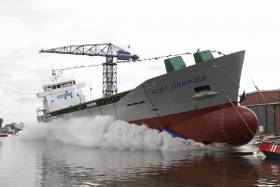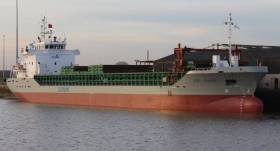Displaying items by tag: Scotline newbuild
Forest Products Cargo 'Carrier' Launched
#Ports&Shipping - Forest products shipping carrier Scotline whose vessels can be seen in Irish Ports, among them Wicklow, had their latest newbuild launched in the Netherlands.
Newbuild Scot Carrier which at 4,800dwt will be the largest in the fleet, was christened almost a week ago in the Royal Bodewes shipyard in Groningen.
According to Scotline, Pat, the Godmother of the vessel, performed her role perfectly last Friday by smashing the champagne bottle for the first time – hopefully a good omen!
Once outfitting is completed this will see the near 90m vessel carry out sea trials.
Scot Carrier is very similar to Scot Leader as previously reported on Afloat. This cargoship was also built at Royal Bodewes, but originally for a different owner. The newbuild been built to comply with all the latest legislation including provisions to be ready for the ballast water treatment system, when they become applicable.
A beam is given at 15.20 meters, while the maximum sailing draft is 5.68 meters and cubics of 235,000 cbf (6650 cbm). A hold depth is just under 9 metres. The hold (also fitted to take containers) has an ice class 1B classification which is important for the operators Baltic customers.
The powerplant is to be provided by a MaK engine.
Scotline primarily runs a 'liner' service around Northern Europe with regular routes between Ireland, Denmark, Sweden, Norway and Germany. In addition liner services linking the Baltic States, the Netherlands, France and the UK. Cargoes vary from forest products to bulk cargoes to project cargoes.
Likewise of the fleetmates, Scot Carrier will be UK flagged and classed under Lloyd’s Register.
As for the port of registry, this is Inverness. The Scottish port is among several terminals used by the Romford in Kent based company. The terminals are located in Gunness on the Trent and a pair of terminals with an office based in Rochester on the river Medway, also in Kent.
Forest Products Operator Orders Another Newbuild from Dutch Yard
#Ports&Shipping - Scotline which chiefly operates in Scandinavian forest products imports among those to Ireland, have announced the signing of a contract with a Dutch shipyard to build a 4,785dwt Bodewes trader.
The description of the newbuild refers to the yard of Royal Bodewes Group BV whose in-house design to build the short-sea trader comes with an option of a second vessel. The Scot Carrier is being built by the same yard as – and will be similar to – the Scot Leader which is a caller to Wicklow Port through local ship agency Conway Port.
Afloat adds among Scotline's network of liner services, the sailing schedule to Wicklow from Varberg, Sweden also includes calls to Belfast and Warrenpoint.
Scot Carrier and will have a length of 89.98 meters, a beam of 15.20 meter and a maximum sailing draft of 5.68 meters. She will be powered by a MAK engine and will sail under the UK flagand classed under Lloyds Register.
The hull is expected to be launched in September 2018 and we expect the finished vessel to be delivered in November 2018. She will be fully container fitted, with Swedish ice class 1B and will be built to comply with all the latest legislation including provisions to be ready for the Ballast Water Treatment regulations.
The Scot Carrier will be the most recent acquisition to Scotline’s fleet of 8 owned vessels. As also previously reported on Afloat, Scot Navigator was delivered last year as the start of our efforts to renew some of our older tonnage.
Scotline runs a fleet of coasters serving northern Europe with regular routes between Sweden, Ireland, Denmark, Germany, Norway, the Baltic States, the Netherlands, France and the UK. In addition to forest products, the operator handles bulk cargoes to project cargoes and many others.
With terminals in Rochester, England and Inverness, Scotland the operators fleet offer customers an all-in-one service of shipping, stockholding and distribution. The company also fixes market cargos for their vessels through use of the operators network of contacts worldwide.

























































